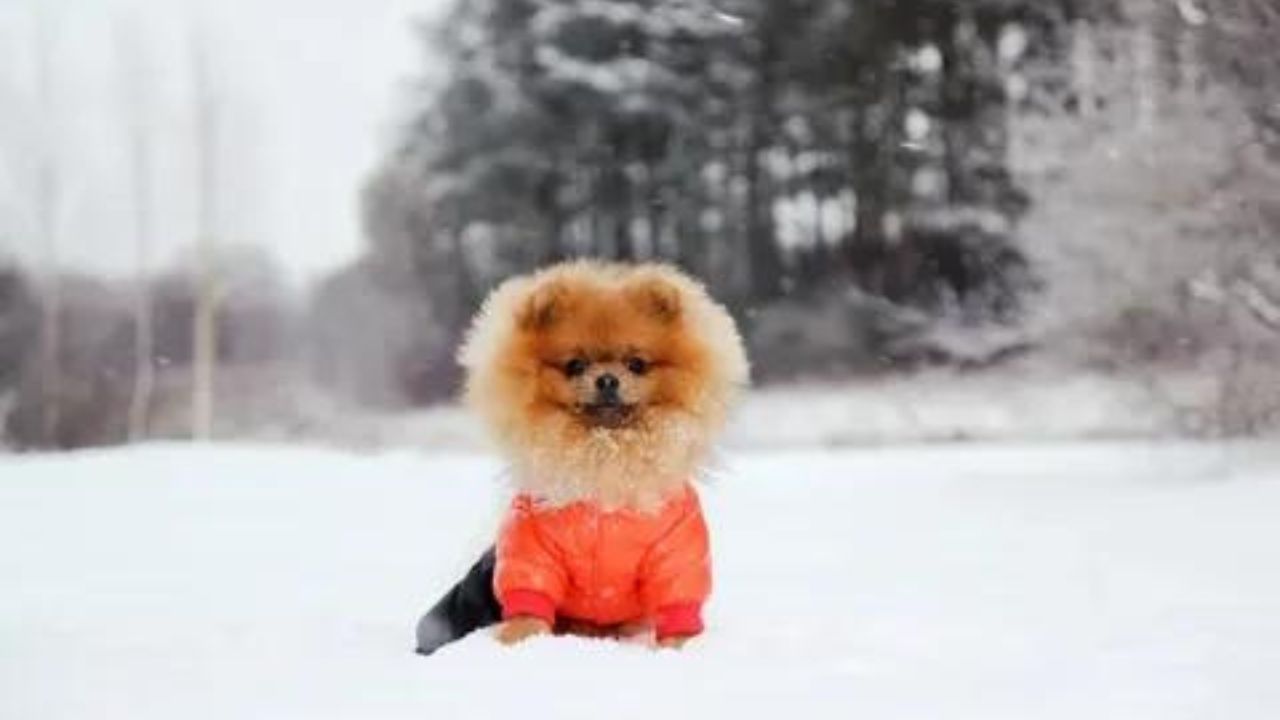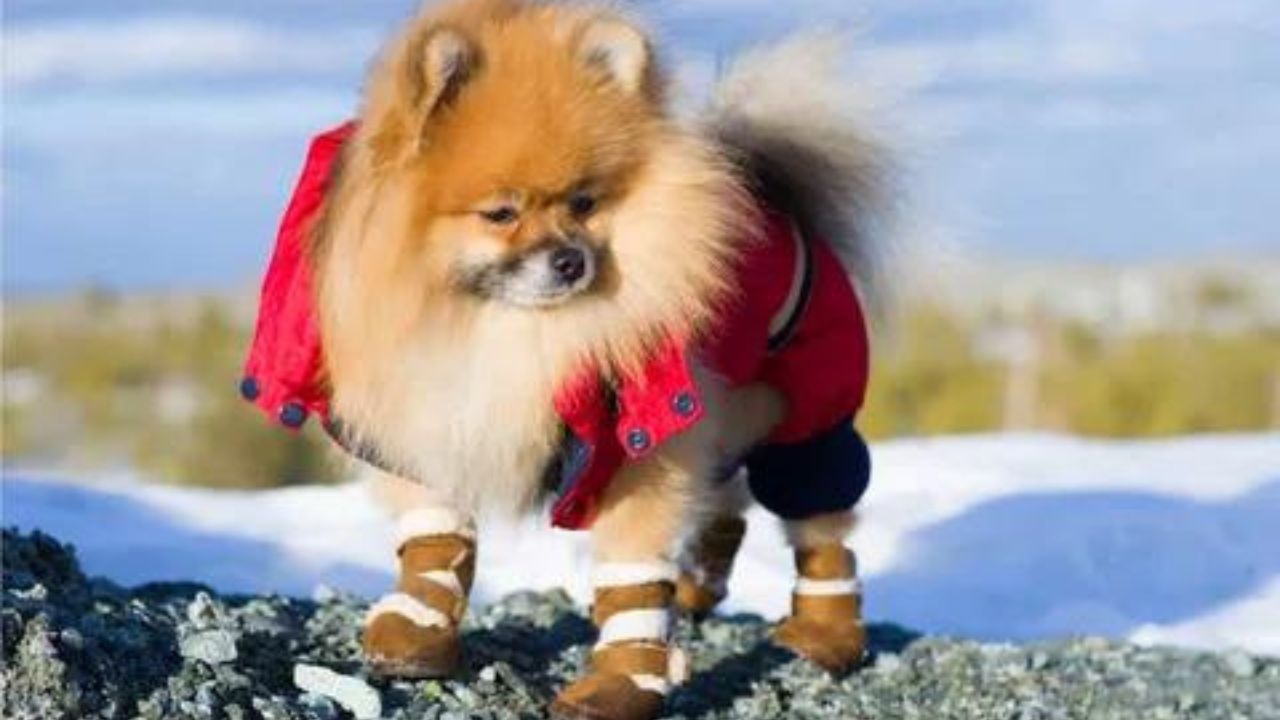Pomeranians are adorable and fluffy little dogs that capture our hearts with their lively personalities and charming looks. If you’re a proud Pomeranian owner or are considering bringing one into your family, it’s essential to understand their needs and preferences regarding different weather conditions. One question frequently asked is, “Do Pomeranians like cold weather?” Let’s explore this topic in detail.
Pomeranians
Before we delve into their preferences for cold weather, let’s learn more about these delightful dogs. Pomeranians, often called Poms, are small, compact dogs weighing between 3 to 7 pounds (1.4 to 3.2 kilograms). They belong to the Spitz family of dogs and have a thick double coat that provides insulation and protection.
Pomeranians are known for their high energy levels, intelligence, and affectionate nature. While they may be small, they have a big personality and are often described as bold and confident.
Cold Tolerance of Pomeranians
Despite their fluffy and thick coat, Pomeranians are generally not well-suited for extreme cold weather conditions. They have some tolerance for cooler temperatures, but precautions should be taken to ensure their well-being.
Temperature Sensitivity
Pomeranians, like many toy breeds, are sensitive to drastic temperature changes. They have a higher risk of experiencing discomfort and health issues when exposed to extreme cold. While every Pom is unique, monitoring their behavior and taking appropriate measures to keep them safe is crucial.
Coat Protection
Pomeranians can withstand freezing temperatures due to their thick fur. However, their fur does not provide the same level of insulation as some other cold-weather breeds. Poms have a double coat with a soft undercoat and a longer, coarser topcoat. While this coat helps them regulate their body temperature somewhat, they still require additional protection in colder conditions.
Paw Care
Another important consideration is the sensitivity of their paws. Pomeranians have small and delicate paws that are more susceptible to cold surfaces. When walking your Pom during winter, it’s advisable to protect their paws from icy or snowy ground using dog booties or paw balm to prevent cracking or discomfort.
Supervised Outdoor Time
While Pomeranians should not be exposed to prolonged periods of cold weather, they can enjoy supervised outdoor activities in milder temperatures. It’s generally safe for them to go outside when the temperature is above 40 degrees Fahrenheit (4.4 degrees Celsius). However, monitoring their behavior and bringing them indoors if they show discomfort, such as shivering or reluctance to move, is essential.
Winter Care Tips for Pomeranians

To ensure the well-being of your Pomeranian during colder months, here are some useful winter care tips:
Limit Outdoor Time
Pomeranians should have limited time outdoors in cold weather. Monitor their behavior closely and bring them inside if they appear uncomfortable or exhibit signs of distress.
Keep Them Warm
When taking your Pom outside in cooler temperatures, consider dressing them in a suitable dog sweater or jacket to provide extra warmth and protection.
Protect Their Paws
Use dog booties or paw balm to protect their sensitive paws from cold surfaces, ice, or salt on roads and sidewalks.
Maintain Indoor Comfort
Ensure your home is warm and cozy for your Pom. Provide a comfortable bed, blankets, or a heated pet mat to keep them comfortable during colder days.
Proper Nutrition
A balanced diet is crucial for maintaining your Pomeranian’s overall health, including their coat. Please consult your veterinarian to ensure they receive appropriate nutrition for their specific needs.
Indoor Activities
Engage your Pom in interactive indoor activities to keep them mentally stimulated and physically active during the colder months. This can include puzzle toys, obedience training, or gentle playtime.
Moisturize Their Skin
Winter weather can be harsh on a Pomeranian’s skin. Consider using a gentle moisturizer or coconut oil to prevent dryness and itching.
Remember, each Pomeranian is unique, and their tolerance for cold weather may vary. It’s always best to consult your veterinarian for personalized advice based on your Pom’s needs and health condition.
Signs of Discomfort in Cold Weather
Paying attention to your Pomeranian’s behavior is crucial in understanding their comfort level in cold weather. Some signs that indicate they may be uncomfortable include shivering, seeking warmth indoors or under blankets, and a reluctance to go outside. If you notice these signs, it’s best to limit their exposure to cold temperatures and take steps to keep them warm.
Grooming Considerations
Regular grooming is important in keeping your Pomeranian comfortable during colder months. While their double coat provides insulation, it can become matted or tangled if not properly maintained. Regular brushing helps remove loose fur, prevents matting, and allows air circulation through the coat. It promotes better insulation and helps keep your Pom warm.
Indoor Heating Precautions
If you use heating devices in your home during the winter, it’s important to ensure your Pomeranian’s safety. Avoid placing portable heaters or open flames near your dog’s bedding or areas they frequent to prevent accidental burns or fire hazards. Additionally, be cautious with space heaters and electrical cords to prevent potential accidents.
Traveling in Cold Weather

Suppose you plan to travel with your Pomeranian during colder months. Making proper arrangements for their comfort and safety is essential in that case. Ensure your vehicle is adequately heated, or use appropriate blankets or heating pads to keep them warm. In case of unexpected delays or emergencies, it’s also advisable to carry extra supplies, such as food, water, and warm clothing.
Health Considerations
Pomeranians, like other small dog breeds, may have certain health conditions that can be aggravated by cold weather. Conditions such as arthritis or respiratory issues may worsen in colder temperatures. Working closely with your veterinarian to manage any pre-existing health concerns and discussing specific precautions or treatments necessary during winter is important.
Alternative Exercise Options
When outdoor conditions are less favorable, finding alternative ways to provide exercise and mental stimulation for your Pomeranian is important. Consider indoor activities such as puzzle toys, interactive games, or training sessions. These activities will help keep your Pom physically active and mentally stimulated and burn off excess energy even when outdoor exercise is limited.
Conclusion
While Pomeranians may not particularly enjoy extremely cold weather, they can still appreciate shorter periods outdoors in milder temperatures with proper precautions. Understanding their sensitivity and providing the necessary care will help ensure their comfort and well-being during winter. By following these tips and observing your Pomeranian’s behavior, you can create a safe and enjoyable environment for your furry friend, regardless of the season.
FAQ
How should I prepare my Pomeranian for cold weather?
Ensure your Pomeranian has a suitable coat for winter, provide a warm and cozy bed, and limit outdoor exposure during extremely cold conditions. Pay attention to signs of discomfort, such as shivering, and adjust accordingly.
Should I dress my Pomeranian in winter clothing?
In colder climates, dressing your Pomeranian in a dog sweater or coat is a good idea to provide additional warmth during walks. It is especially important for Pomeranians with a thinner coat or those less accustomed to cold weather.
How do I know if my Pomeranian is too cold?
Watch for signs of discomfort such as shivering, seeking warmth, or lifting their paws. If your Pomeranian displays these signs, it’s time to bring them indoors or provide extra warmth.
Can I walk my Pomeranian in the snow?
Yes, you can walk your Pomeranian in the snow, but be cautious of icy surfaces and salt on roads, as these can be harsh on their paws. Wipe their paws after walks to remove any salt or ice-melting chemicals.
Can Pomeranians get frostbite or hypothermia?
Yes, Pomeranians are susceptible to frostbite and hypothermia in extremely cold conditions. Limit their exposure to cold weather, especially in freezing temperatures, and monitor their well-being.

